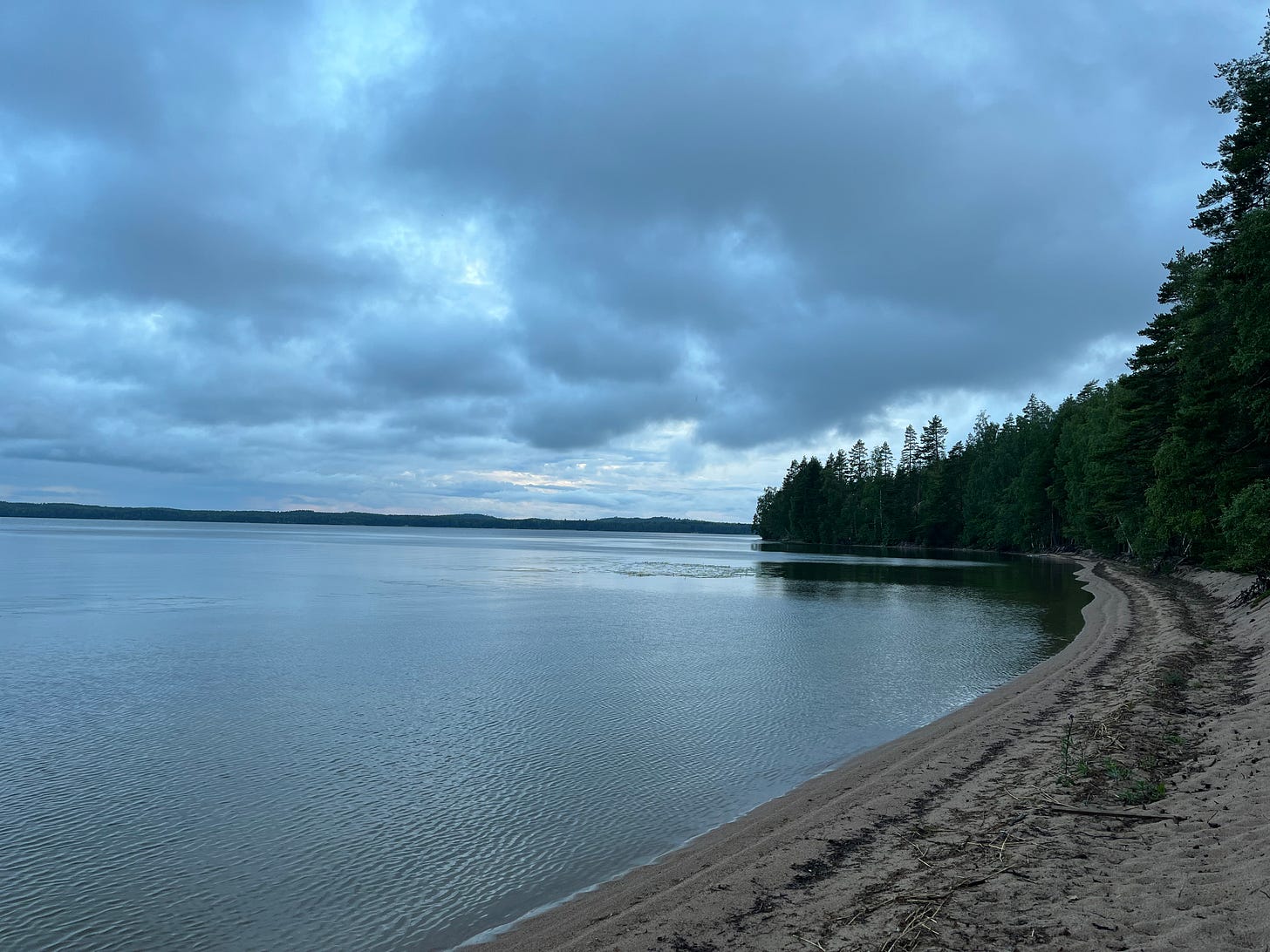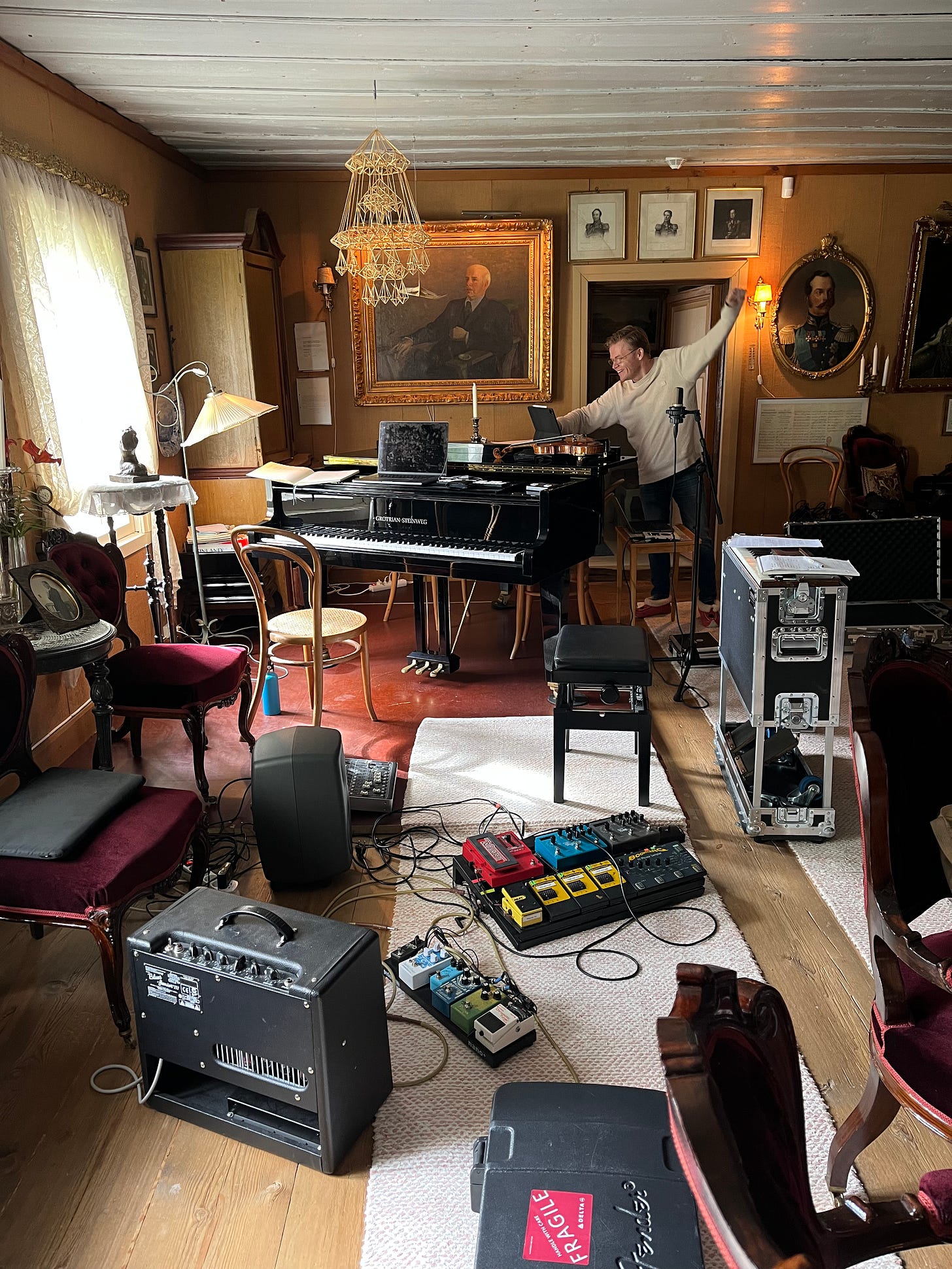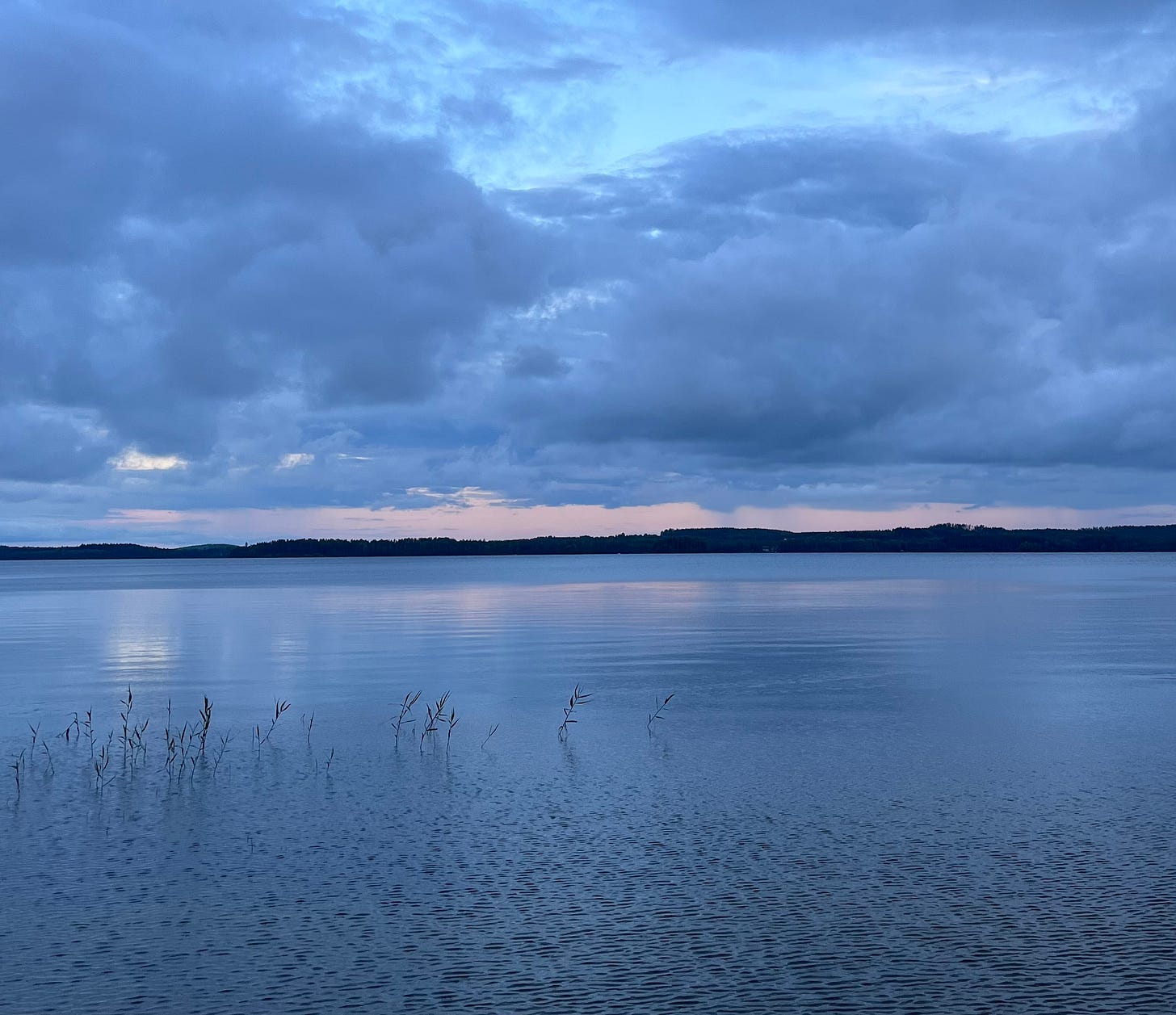When you land in Helsinki, you are bleary-eyed and cotton-mouthed. Your head throbs. This is what it must feel like, you imagine, to have gone ten rounds with Mike Tyson and lost. First, there’s the sleepless 9.5 hr flight arcing across much of Canada and the North Atlantic; the route plus proximity to the estival solstice means no darkness, a permanent twilight even in the wee hours of the morning. It’s eerie, beautiful, destabilizing.
You’re the kind of traveler who leaves the window open, not necessarily because you’re a nervous flier—though, to be clear, you are—but because it’s always felt unnatural to cordon yourself off from the wonder of being suspended several miles above the earth.
You pass the time by reading a few chapters of a newish novel (overwritten but diverting), listening to a buzzy podcast (excellent), and taking in the first installment of a popular action movie franchise (unreasonably violent, eminently watchable). Toggling to the flight tracker, you observe the pixelated jet icon inching toward the continent, rendered in various shades of green. Somewhere over Ireland, there’s an acrid cup of coffee that burns your impatient tongue. Finally, wheels down.
Now, a long-ass intermezzo of a layover at Schiphol Airport in Amsterdam, where you eat something resembling an English breakfast while mainlining too much coffee. Then, for a chaser, there’s the 2.5 hr puddle-jumper into Helsinki, Finland, where you are deposited into a disarmingly clean airport. Two train rides and four hours later, you arrive in the tiny hamlet of Kesälahti—Finnish for “summer bay”—a few miles from the Russian border.
Here—it’s now eleven pm, but the sky is still light—you are met by a beloved colleague and his wife, who shuttle you to a cabin on a lake, a few minutes’ drive from the farm that your colleague’s in-laws have tended for the last two-and-a-half centuries. They help you wrestle your bags inside, say goodnight, and take off. Now you are alone. It will be several days before you have the presence of mind to absorb and process the depth of this solitude. It is a kind of alone-ness that you have never felt before. It’s not only the quiet — and it is quiet — but a bodily awareness of the distance between you and the nearest human being.
For the first of several times during your visit, you walk down the flagstone path to the lake’s edge and sit on a worn wooden bench. The water ripples in tight patterns, pale green reeds jutting out from the surface and swaying lazily in the breeze. Surveying the beach, you see dense forests to the left and right set back just a few feet from the shore. On the other side of the lake, more forests. Above you, clouds that are pink but also grey and blue.
You and your colleague—the violinist Pekka Kuusisto—have agreed to meet here for a writing retreat in preparation for a duo tour next spring. In the living room of a house built in the 1760’s, you assemble a petting zoo of musical instruments: to begin, there is a piano, and Pekka’s violin, but also a harmonium, your electric guitar, and his electric violin, run through an array of guitar pedals, from which he summons otherworldly and sometimes terrifying textures and tableaus.
Pekka is a unicorn. He plays Beethoven, Ligeti, and Sibelius concertos with the leading orchestras around the world. He is establishing a significant career as a conductor. He is known for his omnivorous approach to programming, juxtaposing folk singers and hard-core modernists on a single concert, while advocating for an ever-growing slate of living composers. He also has a great love, and deep knowledge, of Scandinavian folk music.
Impressive as it is, it’s not Pekka’s CV that makes him one of your favorite living musicians. It is, above all, his singular approach to color and timbre that sets him apart from nearly all other string players. By varying the amount of pressure he uses with the left hand, in conjunction with a seemingly limitless array of bow speeds, angles, and gradations of power, Pekka achieves a variety of color—always in service of emotional substance—that may be unparalleled. Finally, he is a communicator, as one can see in this encore at the Proms in London.
Now, he’s stretching himself further, writing songs with you for a project that will land in two or perhaps three continents in the next couple of years.
For six days, you meet mid-morning, sometimes working in separate rooms to begin new sketches, other times workshopping ideas together that had emerged the day before. At 1pm, you walk downhill a few paces to the home of L.’s parents for lunch. (L. is Pekka’s wife. Also present at these mid-day family meals are L.’s sister and her husband, as well as Pekka and L.’s five-year-old daughter, F., who is extremely musical, and given to randomly belting out single notes with cartoonish vibrato. Cuteness explosion.)
The formality of the table-setting—napkins folded conically, ceramic dinnerware for each course—belies the warmth and informality of these meals. There will be pale pink salmon soup, sliced cucumbers, perhaps a platter of fried vendace (a small whitefish; think sardines, but sweeter and less fishy). Afterward, L.’s mother produces containers of ice cream along with platters of cookies and Finnish licorice, saltier than Gilbert Gottfried doing "The Aristocrats.”
It is the second week of the month-long holiday in Finland, and everyone is extremely relaxed. Over coffee, the conversation may turn to the Finnish political climate, which has, with the latest round of elections, taken a rightward turn, led by the nativist “True Finns” party. From what you could glean, their platform consists of aggressive cuts to the social safety net combined with a xenophobic-with-a-generous-splash-of-racism immigration policy: MAGA with a Finnish accent. But at least in this left-leaning household, anxiety about this rightward drift is tempered by the incompetence of the party’s figureheads. Nazi-sympathizing Facebook posts have been unearthed; resignations have followed, etc. In this country, it seems that there are still consequences for doing vile and shameful things!
Back in the makeshift studio after lunch, there will be more music, further experiments to establish the sound-world of this project. Any collaboration is an exercise in trust. You know, from what little you’ve done together in the past, that there’s a chemistry between, and an emotional core shared, by the two of you. Throughout each working session, you abide by the first rule of comedy—“yes, and…”—building off of each other’s ideas, suggesting revisions, additions, omissions. By week’s end, a dozen sketches have begun to resemble songs, and you will leave with a sense of excitement and optimism.
At the close of the day, there is dinner with the extended family, often capped by you and Pekka playing a work-in-progress. Then, there might be a visit to the sauna, which overlooks another in the formidable network of lakes, which, viewed on a map, looks like a child’s finger-painting, or an oil-stained blue-green garment. One evening, L’s father explains that in the 1970’s, Soviet searchlights on the opposite side of the water would routinely hit the sauna’s walls, sometimes catching naked bodies returning from a swim. He conveys this information in a matter-of-fact tone glazed with amusement.
But when you return to your cabin alone and sit once more by the water, grief wells up in you, not supplanting the sense of peace you’ve found by the lake, but meeting it in odd equipoise. Russia is nearly visible from the shoreline, you’ve been told, and your mind wanders south, to the war raging well into its second year, reducing men to animals and cities to rubble, stealing innocence, abbreviating lives, traumatizing children. Elsewhere, there are unprecedented fires and heat waves engulfing large swaths of the planet in what amounts to a human kiln. (Meanwhile, here you were, sweating, for pleasure, in a sauna.) And that’s not to speak of the craven legislative assaults on civil liberties and human rights back home in the States.
One of the stubborn ethical quandaries of modern, global society is deciding where to put not only your material resources, but your emotional resources as well. You remember a conversation you overheard years ago between two rabbis, both of whom you admired deeply, who took opposing sides of this argument: one suggested that, given limited resources, his obligation was to his neighbor; the other, to those further away, but who were, in her estimation, more materially in need. You could see the merit in both positions. Looking out at the pastel smear of summer sky, you wonder how much of the ugliness of domestic politics results from collective psychological burnout: in the face of the unwieldy emotional triage that must be revisited and reassessed minute by minute, hour by hour, is it any wonder that tribalism and contempt rule the day?
On Sunday evening, Pekka and L. drop you off at the Kesälahti train station, and you retrace your steps in reverse, arriving at the Helsinki Airport late at night. You haul your bags down to a subterranean hotel, where you sleep for a few fitful hours in a windowless room before a 7am flight back to Amsterdam. Then, ten hours back to Portland, and you are reunited with your family, and normal life resumes, whatever that is.








Exquisitely written. Bravo.
I'm originally from Joensuu (and now live in Tampere), so the landscapes are extremely familiar to me.
Check https://jacobin.com/2023/07/finland-finns-party-national-coaliton-far-right-neoliberalism if you want to read a bit more about the political situation.